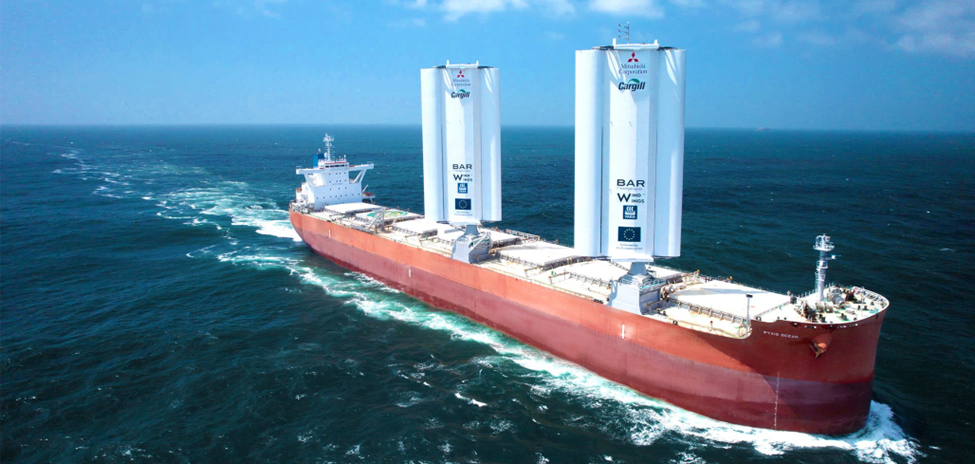At Terra Alpha we work every day to enable a sustainable planet for society, and a particular area of focus in our science driven approach is decarbonization of the global economy. One industry that has demonstrated innovation in reducing carbon emissions is the shipping industry, seen through the development of wind-powered cargo ships.
Accounting for about 90% of total world trade transportation, the shipping industry as a whole is a hugely polluting sector, responsible for about 3% of global CO2 emissions.1 According to the International Maritime Organization (IMO), the industry produces over 830 million tonnes of carbon each year, mainly due to its reliance on cheap heavy fuel.2 The shipping industry is under pressure from the environmental community to reduce their impact on the planet and become a greener sector.
Cargill, a global agricultural products company and one of the world’s largest agricultural trading firms, could reshape the future of the shipping industry with the emerging wind-powered sail technology. With the goal of reducing greenhouse gas emissions, these wind-powered sails, known as WindWings, stand at 123 feet tall and are made from steel and glass composite, the same material as durable wind turbines.
Developed by UK firm BAR Technologies, WindWings are designed to cut fuel consumption. This technology could be a turning point for the maritime industry, as harnessing the wind’s power rather than relying solely on a ship’s engine is estimated to reduce a ship’s lifetime emissions by 30%.3 BAR Technologies CEO, John Cooper, who previously worked for Formula One team McLaren, said “This is one of the most slow-moving projects we’ve done, but without doubt with the biggest impact for the planet.”4
With the wind propulsion technology, one ship fitted with four WindWings expects to save approximately six tonnes of fuel per day, resulting in a significant reduction of 20 tonnes of CO2 emissions per day.5 This substantial reduction in emissions also help vessels meet the energy efficiency regulations put in place by the IMO at the beginning of this year.6
By exploring cleaner power sources and through innovations like WindWings, there are many players doing their part to move the entire shipping industry forward on its journey to decarbonize. While there is uncertainty surrounding cost-effectiveness and adoption of this new technology, as one of the larger players in the industry, Cargill is assuming some of the risks with the wind-powered cargo ships in the hopes of navigating the entire industry toward a more sustainable future.
If you are interested in reading more about corporate work to lower negative environmental impacts, please see other EP Insights from Terra Alpha here.
_________
1 https://www.oecd.org/ocean/topics/ocean-shipping/
2 https://carboncredits.com/cargill-pioneers-wind-powered-cargo-ship-to-cut-carbon-emissions/
3 https://www.bbc.com/news/technology-66543643
4 https://www.bbc.com/news/technology-66543643
5 https://earth.org/navigating-towards-sustainability-wind-powered-cargo-ships-and-the-future-of-the-shipping-industry/
6 https://www.imo.org/en/MediaCentre/PressBriefings/pages/CII-and-EEXI-entry-into-force.aspx
Photo: https://www.bartechnologies.uk/insights/pyxis-ocean-launches-with-2-windwings/

